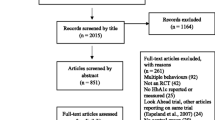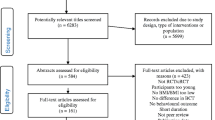Abstract
The use of material incentives in healthy lifestyle interventions is becoming widespread. However, self-determination theory (SDT) posits that when material incentives are perceived as controlling, they undermine intrinsic motivation. We analyzed data from the Make Better Choices trial—a trial testing strategies for improving four risk behaviors: low fruit–vegetable intake, high saturated fat intake, low physical activity, and high sedentary activity. At baseline, participants reported the degree to which financial incentives were an important motivator (financial motivation); self-reported enjoyment of each behavior was assessed before and after the 3-week incentivization phase. Consistent with SDT, after controlling for general motivation and group assignment, lower financial motivation predicted more adaptive changes in enjoyment. Whereas participants low in financial motivation experienced adaptive changes, adaptive changes were suppressed among those high in financial motivation.

Similar content being viewed by others
Notes
Moderation: Gender To investigate whether gender moderated the relation between Financial Motivation and changes in liking FV, Fat, PA, and Sed, we next ran the above MANCOVA model adding Gender, and the 3-way interaction of Financial Motivation × Time × Gender. This 3-way interaction did not significantly predict changes in liking FV [F(1, 167) = 0.62, p = .43], liking Fat [F(1, 167) = 0.04, p = .85], liking PA [F(1, 167) = 1.28, p = .26], or liking Sed [F(1, 167) = 1.27, p = .26)].
SES To investigate whether socioeconomic status moderated the relation between Financial Motivation and changes in liking FV, Fat, PA, and Sed, we next ran the above MANCOVA model adding estimates of household income, and the 3-way interaction of Financial Motivation × Time × Income. This 3-way interaction did not significantly predict changes in liking FV [F(1, 167) = 1.76, p = .19], liking Fat [F(1, 167) = 0.23, p = .63], liking PA [F(1, 167) = 0.64, p = .43], or liking Sed [F(1, 167) = 0.98, p = .33)]. We note, however, that our measure of annual household income was negatively skewed; the modal response (28 %) reported an annual household income greater than $75,000, potentially suppressing our ability to detect Financial Motivation × Time × Income interactions.
References
Burns, R. J., Donovan, A. S., Ackermann, R. T., Finch, E. A., Rothman, A. J., & Jeffery, R. W. (2012). A theoretically grounded systematic review of material incentives for weight loss: Implications for interventions. Annals of Behavioral Medicine, 44, 375–388.
Deci, E. L., Koestner, R., & Ryan, R. M. (1999). A meta-analytic review of experiments examining the effects of extrinsic rewards on intrinsic motivation. Psychological Bulletin, 125, 627–668.
Deci, E. L., & Ryan, R. M. (1985). Intrinsic motivation and self-determination in human behavior. New York: Plenum.
Deci, E. L., & Ryan, R. M. (2000). The “what” and “why” of goal pursuits: Human needs and the self-determination of behavior. Psychological Inquiry, 11, 227–268.
Hagger, M. S., & Chatzisarantis, N. L. D. (2011). Causality orientations moderate the undermining effect of rewards on intrinsic motivation. Journal of Experimental Social Psychology, 47, 485–489.
Hagger, M. S., Keatley, D. A., Chan, D. C. K., Chatzisarantis, N. L. D., Dimmock, J. A., Jackson, B., et al. (2013). The goose is (half) cooked: A consideration of the mechanisms and interpersonal context is needed to elucidate the effects of personal financial incentives on health behavior. International Journal of Behavioral Medicine,. doi:10.1007/s12529-013-9317-y
Lussier, J. P., Heil, S. H., Mongeon, J. A., Badger, G. J., & Higgins, S. T. (2006). A meta-analysis of voucher-based reinforcement therapy for substance use disorders. Addiction, 101, 192–203.
Lynagh, M. C., Sanson-Fisher, R. W., & Bonevski, B. (2013). What’s good for the goose is good for the gander. Guiding principles for the use of financial incentives in health behaviour change. International Journal of Behavioral Medicine, 20, 114–120.
Mata, J., Silva, M. N., Vieira, P. N., Carra, E. V., Andrade, A. M., Coutinho, S. R., et al. (2009). Motivational “spill-over” during weight control: Increased self-determination and exercise intrinsic motivation predict eating self-regulation. Health Psychology, 28, 709–716.
Medic, N., Mack, D. E., Wilson, P. M., & Starkes, J. L. (2007). The effects of athletic scholarships on motivation in sport. Journal of Sport Behavior, 30, 292–306.
Moller, A. C., & Deci, E. L. (in press). Psychology of getting paid: An integrated perspective. In E. Bijleveld & H. Aarts (Eds.), The psychological science of money. Springer.
Moller, A. C., McFadden, H. G., Hedeker, D., & Spring, B. (2012). Financial motivation undermines maintenance in an intensive diet and activity intervention. Journal of Obesity. doi:10.1155/2012/740519.
National Business Group on Health and Fidelity Investments Benefits Consulting (2013). Employer investments in improving employee health. Retrieved from http://www.businessgrouphealth.org/pressroom/pressRelease.cfm?ID=207
Paul-Ebhohimhen, V., & Avenell, A. (2007). Systematic review of the use of financial incentives in treatments of obesity and overweight. Obesity Reviews, 9, 355–367.
Promberger, M., & Marteau, T. M. (2013). When do financial incentives reduce intrinsic motivation? Comparing behaviors studied in psychological and economic literatures. Health Psychology, 32, 950–957.
Rozin, P., Levine, E., & Stoess, C. (1991). Chocolate craving and liking. Appetite, 17, 199–212.
Ryan, E. D. (1977). Attribution, intrinsic motivation, and athletics. In: L. I. Gedvilas & M. E. Kneer (Eds.), National College Physical Education Association for Men/National Association for Physical Education of College Women. National Conference (pp. 346-353). Chicago, IL: Office of Publications Services.
Ryan, E. D. (1980). Attribution, intrinsic motivation, and athletics: A replication and extension. In C. H. Nadeau, W. R. Halliwell, K. M. Newell, & G. C. Roberts (Eds.), Psychology of motor behavior and sport (pp. 19–26). Champaign, IL: Human Kinetics.
Ryan, R. M., Frederick, C. M., Lepes, D., Rubio, N., & Sheldon, K. M. (1997). Intrinsic motivation and exercise adherence. International Journal of Sport Psychology, 28, 335–354.
Ryan, R. M., Mims, V., & Koestner, R. (1983). Relation of reward contingency and interpersonal context to intrinsic motivation: A review and test using cognitive evaluation theory. Journal of Personality and Social Psychology, 45, 736–750.
Silva, M. N., Markland, D., Vieira, P. N., Carraca, E. V., Vieira, P. N., Coutinho, S. R., et al. (2011). Exercise autonomous motivation predicts 3-yr weight loss in women. Medicine and Science in Sports and Exercise, 43, 728–737.
Silva, M. N., Vieira, P. N., Coutinho, S. R., Minderico, C. S., Matos, M. G., Sardinha, L. B., et al. (2010). Using self-determination theory to promote physical activity and weight control: A randomized controlled trial in women. Journal of Behavioral Medicine, 33, 110–122.
Skinner, B. F. (1974). About Behaviorism. New York: Knopf.
Spring, B., Schneider, K., McFadden, H. G., Vaughn, J., Kozak, A. T., Smith, M., et al. (2012). Multiple behavior change in diet and activity: A randomized controlled trial using mobile technology. Archives of Internal Medicine, 72, 789–796.
Spring, B., Schneider, K., McFadden, H. G., Vaughn, J., Kozak, A. T., Smith, M., et al. (2010). Make Better Choices (MBC): Study design of a randomized controlled trial testing optimal technology-supported change in multiple diet and physical activity risk behaviors. BMC Public Health, 10, 586.
Teixeira, P. J., Silva, M. N., Coutinho, S. R., Palmeira, A. L., Mata, J., Vieira, P. N., et al. (2010). Mediators of weight loss and weight loss maintenance in middle-aged women. Obesity, 18, 725–735.
Wagner, S. L., Lounsbury, J. W., & Fitzgerald, L. G. (1989). Attribute factors associated with work/leisure perceptions. Journal of Leisure Perceptions, 21, 155–166.
Williams, G. C., Grow, V. M., Freedman, Z., Ryan, R. M., & Deci, E. L. (1996). Motivational predictors of weight-loss and weight-loss maintenance. Journal of Personality and Social Psychology, 70, 115–126.
Acknowledgments
The Make Better Choices trial was supported by National Institutes of Health (NIH) grant HL075451 to Dr. Spring, by the Robert H. Lurie Comprehensive Cancer Center Grant (NIH P30 CA060553), and by NIH F31 MH070107 to Dr. Schneider. We thank Sarah Altman, Katherine Bailey, Katty Cavero, Michael J. Coons, Neil Doran, Anne Maloney, Dennis McChargue, Sherry Pagoto, Anjali Pandit, Jim Painter, Michael Painter, Christine Dutton Pellegrini, Alex Pictor, Natalie Ritchie, Megan Roehrig, and Stephanie Russell for their contributions and technical assistance.
Author information
Authors and Affiliations
Corresponding author
Rights and permissions
About this article
Cite this article
Moller, A.C., Buscemi, J., McFadden, H.G. et al. Financial motivation undermines potential enjoyment in an intensive diet and activity intervention. J Behav Med 37, 819–827 (2014). https://doi.org/10.1007/s10865-013-9542-5
Received:
Accepted:
Published:
Issue Date:
DOI: https://doi.org/10.1007/s10865-013-9542-5




